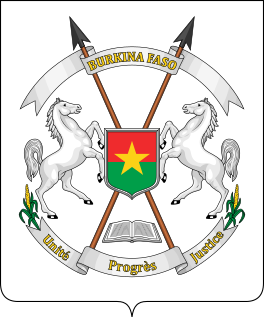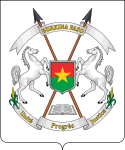
The Politics of Burkina Faso takes place in a framework of a semi-presidential republic, whereby the Prime Minister of Burkina Faso is the head of government, and of a multi-party system. The President of Burkina Faso is the head of state. Executive power is exercised by both the President and the Government. Legislative power is vested in both the government and parliament. The party system was dominated by the Congress for Democracy and Progress (CDP) until the 2014 Burkinabé uprising. Since then, the CDP has lost influence. The Judiciary is independent of the executive and the legislature. The Economist Intelligence Unit rated Burkina Faso as a "hybrid regime" in 2016.

Roch Marc Christian Kaboré is a Burkinabé politician and banker and the President of Burkina Faso, in office since 2015. Previously he served as the Prime Minister of Burkina Faso between 1994 and 1996 and President of the National Assembly of Burkina Faso from 2002 to 2012. He also served as President of the Congress for Democracy and Progress (CDP). In January 2014, he left the ruling CDP and joined a new opposition party, the People's Movement for Progress.

Presidential elections were held in Burkina Faso on 13 November 2005. Incumbent president Blaise Compaoré was re-elected with around 80% of the vote.
Bénéwendé Stanislas Sankara is a Burkinabé politician and the President of the Union for Rebirth/Sankarist Movement (UNIR/MS) party.
Pargui Emile Paré is a Burkinabé politician and member of the People's Movement for Socialism/Federal Party (MPS/FP).

Change 2005 was a political alliance in Burkina Faso, founded to contest the presidential election in 2005. The incumbent, Blaise Compaore, was standing for a third term and was expected to win despite claims that another term in office would be unconstitutional. He was re-elected with 80.35% of the votes.

Movement for Tolerance and Progress is a Sankarist political party in Burkina Faso. It was founded in September 1987. It is led by Nayabtigungu Congo Kaboré. It won 0.3% of the popular vote in the parliamentary elections of 1997. In 2005 the party took part in the presidential election of 13 November, where its candidate Nayabtigungu Congo Kaboré won 0.32% of the popular vote.
Articles related to Burkina Faso include:
Simon Compaoré is a Burkinabé politician who served as Mayor of Ouagadougou, the capital of Burkina Faso, from 1995 to 2012. He was a prominent member of the ruling Congress for Democracy and Progress (CDP), but he left the CDP and participated in the formation of the opposition People's Movement for Progress (MPP) in 2014. Following the MPP's victory in the 2015 election, he was appointed to the government. He has served as Minister of State for Internal Security since January 2016, and he also held the ministerial portfolio for territorial administration from January 2016 to February 2017.

Parliamentary elections were held in Burkina Faso on 2 December 2012. They were the first elections held since the National Assembly dissolved the National Electoral Commission in 2011, following fraud allegations concerning the 2010 presidential elections. Municipal elections for over 18,000 councillors were held simultaneously. The elections were held amidst a period of political uncertainty, following protests against President Blaise Compaore's regime.
Sankarism is a term sometimes applied to denote a left-wing ideological trend within the political milieu of Burkina Faso, a landlocked country in West Africa, as well as the policies of the military government led by Captain Thomas Sankara. Sankara came to power in what was then the Republic of Upper Volta in a popularly-supported 1983 military coup, and ruled until his assassination in a coup led by Blaise Compaoré in 1987.

General elections were held in Burkina Faso on 29 November 2015. The elections were the first national elections in the country since the 2014 Burkinabé uprising and the departure of President Blaise Compaoré, who had ruled Burkina Faso for 27 years. The party of former President Compaoré, the Congress for Democracy and Progress, was banned from running a presidential candidate but was still able to participate in the parliamentary election.

The Burkinabé uprising was a series of demonstrations and riots in Burkina Faso in October 2014 that quickly spread to multiple cities. They began in response to attempts at changing the constitution to allow President Blaise Compaoré to run again and extend his 27 years in office. Pressure for political change came from civil society and in particular from the country’s youth. Following a tumultuous day on 30 October, which included the involvement of former Defence Minister Kouamé Lougué and the burning of the National Assembly and other government buildings as well as the ruling Congress for Democracy and Progress party's headquarters, Compaoré dissolved the government and declared a state of emergency before eventually fleeing to Côte d'Ivoire with the support of President Alassane Ouattara.
The Republican Front was a coalition of political parties in Burkina Faso. The coalition was launched on January 23, 2014 at a conference held at Hotel Splendid in the capital Ouagadougou. Some forty political parties took part in the foundation of the coalition. The coalition emerged in response to popular protests against reform of Article 37. The coalition supported holding a referendum on Article 37 of the Constitution, which would have enabled the president Blaise Compaoré took be re-elected. Amongst the leaders present at the founding of the Republican Front were Assimi Kouanda, Alain Zoubga, Ram Ouédraogo, Hermann Yaméogo, Maxime Kaboré, Toussaint Abel Coulibaly and Diemdoda Dicko (CFD).

The Greens of Burkina is a political party in Burkina Faso.
The 2003 Burkinabé coup d'état attempt was an alleged plot in the landlocked African country Burkina Faso that took place in October 2003. The attempted coup was carried out against long-time strongman President Blaise Compaoré and his Congress for Democracy and Progress regime, and resulted in the imprisonment of several members of the armed forces and political dissidents. Over a decade later, Compaoré would finally be overthrown in the 2014 Burkinabé uprising.

The People's Movement for Progress is a political party in Burkina Faso that was founded on 25 January 2014 by former Congress for Democracy and Progress member Roch Marc Christian Kaboré. Kaboré ran as the party's presidential candidate in the November 2015 general election and was elected in the first round of voting; the MPP also won a plurality of seats in the National Assembly of Burkina Faso. It is a full member of Socialist International.








